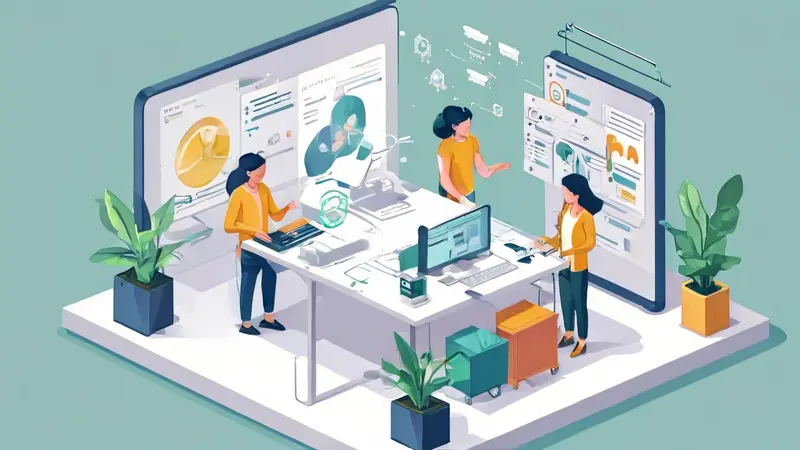Teamwork is the cornerstone of success. It can significantly improve efficiency, unite teams, stimulate innovation, optimize decision-making, and ultimately enhance team competitiveness. The editor of Downcodes will discuss in depth how team collaboration can improve work efficiency from five aspects, along with related questions and answers to help you better understand the meaning and methods of team collaboration.

Teamwork spirit is the foundation of every successful team. It helps improve work efficiency, enhance team cohesion, promote innovative thinking, improve decision-making quality, and enhance competitiveness. The importance of teamwork spirit is not only that it can make work go more smoothly, but more importantly, it can focus everyone's strength to face challenges together and create greater value together. Now I will expand on this aspect of improving productivity.
1. Improve work efficiency
Teamwork can significantly improve work efficiency. In a team, each member has their own expertise and strengths. Through collaboration, they can combine these strengths with each other, make up for each other's shortcomings, and complete tasks together. This will not only improve overall work efficiency, but also allow everyone to maximize their effectiveness in their areas of expertise, thereby achieving the team's goals.
For example, in a development team, some people are good at front-end design, some are proficient in back-end development, and some have extensive experience in database management. They can each work in their own areas of expertise while collaborating with each other to integrate their work results and complete the project together. This not only improves work efficiency, but also ensures the quality of the project.
2. Enhance team cohesion
Teamwork can also enhance team cohesion. In the process of collaboration, team members need to trust and rely on each other to ensure smooth team cooperation. This mutual trust and dependence will enhance the cohesion of the team, allowing team members to unite more closely and face difficulties and challenges together.
In addition, teamwork can also promote communication and communication among team members. In the process of collaboration, team members need to constantly exchange ideas and share information to ensure that the team's work proceeds smoothly. This kind of communication and exchange can not only enhance the cohesion of the team, but also improve the team's work efficiency.
3. Promote innovative thinking
Teamwork also promotes innovative thinking. In a team, everyone has their own unique way of thinking and perspective. In the process of collaboration, they can exchange ideas and come up with new ideas, thereby stimulating innovative thinking.
For example, in a design team, if everyone puts forward their own design plan from their own perspective, and then everyone discusses and learns from each other, it is possible to create a unique design. This is the innovative thinking brought about by team collaboration.
4. Improve decision-making quality
Teamwork also improves the quality of decision-making. In the team, everyone can participate in the decision-making process, and everyone can put forward their own opinions and suggestions from their own perspective. In this way, problems can be considered from multiple angles, avoiding the bias caused by a single perspective, thereby improving the quality of decision-making.
For example, in a management team, if everyone can participate in the decision-making process, then more factors can be taken into consideration when making decisions, and issues can be considered from multiple angles, thereby making a more comprehensive and accurate decision. decision.
5. Enhance competitiveness
Teamwork can also enhance the team's competitiveness. In today's highly competitive society, if a team wants to succeed, it must have strong competitiveness. Teamwork is an important means to improve competitiveness.
Through team collaboration, everyone can maximize their effectiveness in their areas of expertise and complete tasks together, which can improve the team's work efficiency and enhance its competitiveness. At the same time, teamwork can also promote the generation of innovative thinking and improve the quality of decision-making, which are important factors in improving competitiveness.
In short, the importance of teamwork cannot be ignored. Whether it is to improve work efficiency, enhance team cohesion, promote innovative thinking, improve decision-making quality, and enhance competitiveness, team collaboration plays an indispensable role.
1. What is the importance of teamwork? Teamwork spirit refers to the attitude and behavior of team members to cooperate and support each other. It is very important to the success of a team because it promotes communication and cooperation among team members and enhances team cohesion and efficiency.
2. How does team spirit affect team performance? Teamwork can improve team performance. When there is a good spirit of collaboration among team members, they will work better together, share information and resources, thereby improving work efficiency and quality. Teamwork spirit can also promote mutual learning and growth among team members, further improving team performance.
3. How to cultivate teamwork spirit? Cultivating team spirit requires joint efforts among team members. First, establish good communication channels and mechanisms to encourage team members to share opinions and ideas. Secondly, set clear team goals and role divisions so that each member knows his or her responsibilities and contributions. In addition, team members are encouraged to support and help each other to build a positive team culture. Finally, conduct regular team evaluation and feedback to continuously improve team collaboration.
I hope the analysis by the editor of Downcodes will be helpful to you! The success of teamwork depends on the active participation and joint efforts of each member. Continuously learn and improve how your team works together to maintain an advantage in a highly competitive environment.